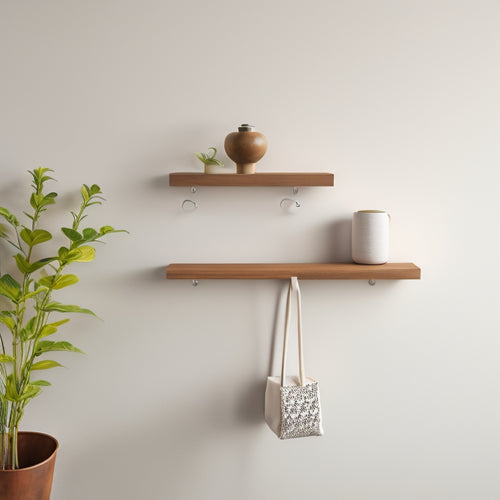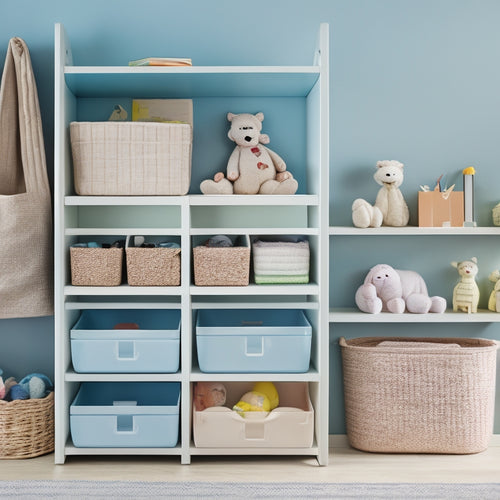
Best Wall Hooks for Heavy Items
Share
When it comes to hanging heavy items, you need wall hooks that can bear the weight, and choosing the right one is vital to prevent damage, injury, or worst-case scenario, a complete collapse. Look for hooks with a weight capacity above 50 pounds, made from heavy-duty materials like stainless steel or heavy-gauge metal, and designed for your specific wall type. Secure mounting systems and anchor types, such as screw-in anchors or molly bolts, provide extra support. By considering these factors, you'll find the right hook for your heavy items, and taking the next step will reveal even more important details to guarantee a safe and sturdy installation.
Key Takeaways
- Look for heavy-duty wall hooks made from stainless steel or heavy-gauge metal with a weight capacity above 50 pounds for reliable support.
- Choose hooks designed for your specific wall type, whether it's drywall, concrete, or brick, to ensure a secure hold.
- Select hooks with a secure mounting system, such as screws or anchors, to prevent loosening over time and support heavy loads.
- Consider the size and shape of the item and available wall space when selecting a hook to ensure a stable and secure fit.
- Always check the manufacturer's weight capacity rating and follow installation instructions to ensure safe and secure hanging.
Top Picks for Heavy Loads
When it comes to hanging heavy items, you need wall hooks that can withstand the weight and keep your belongings safe and secure. Look for hooks with a high weight capacity, typically above 50 pounds, to guarantee your heavy items are properly supported.
Opt for heavy-duty wall hooks made from durable materials like stainless steel or heavy-gauge metal. These can handle heavy item storage without compromising wall space optimization.
You'll also want to take into account the type of wall you have, as some hooks are specifically designed for drywall, concrete, or brick.
Choose hooks with a secure mounting system, such as screws or anchors, to prevent the hook from coming loose over time.
Additionally, take into account the size and shape of the item you're hanging, as well as the available wall space, to select the most suitable hook.
Types of Wall Hooks Explained
You'll find that wall hooks come in various materials, each with its own strengths and weaknesses.
When choosing the right hook for your heavy item, you'll need to evaluate the type of material that can support the weight.
Additionally, you'll also need to think about the mounting options, as they can affect the hook's overall stability and load capacity.
Hook Materials Matter
Three primary materials dominate the wall hook market: metal, plastic, and wood. Each has its strengths and weaknesses, which you should consider when choosing the best wall hook for heavy items.
| Material | Characteristics |
|---|---|
| Metal | Durable, resistant to rust and corrosion, suitable for heavy loads |
| Plastic | Lightweight, affordable, prone to breakage under heavy loads |
| Wood | Aesthetically pleasing, eco-friendly, may not be suitable for extremely heavy loads |
When selecting a wall hook, you need to think about the hook design and weight distribution. A sturdy metal hook with a well-balanced design can handle heavy weights, while a flimsy plastic hook may snap under the pressure. Wooden hooks, on the other hand, can add a touch of elegance to your room, but may not be the best choice for extremely heavy items. By understanding the characteristics of each material, you can make an informed decision and confirm your wall hook can safely hold your heavy items.
Mounting Options Vary
About six common types of wall hooks cater to different mounting needs and heavy item requirements.
You'll find that each type is designed to handle specific weights and accommodate various wall surfaces. For instance, screw-in hooks are ideal for solid walls, while adhesive hooks work better on hollow or drywall surfaces.
When choosing the right hook, consider the wall surface you're working with. Will you be mounting on plaster, wood, or concrete? Different mounting techniques are required for each surface.
For example, anchors are necessary for hollow walls to prevent the hook from pulling out, while molly bolts provide extra grip on plaster walls.
Additionally, think about the weight and size of the item you're hanging. Will it be a heavy piece of artwork or a bulky bike?
Make certain the hook you select is rated for the weight and can accommodate the item's dimensions. By considering these factors, you can guarantee a safe and secure installation that will hold up over time.
Maximum Weight Capacity Matters
Determining the weight capacity of a wall hook is essential, as exceeding it can lead to damage, injury, or even fatalities.
When choosing a wall hook for heavy items, you must consider the maximum weight it can safely hold. This isn't just about the item's weight, but also how the weight is distributed. For example, a hook that can hold 50 pounds may not be able to handle a 50-pound item that's unevenly distributed.
To guarantee your safety, follow these guidelines:
-
Check the manufacturer's rating: Look for the recommended weight capacity on the product label or instructions.
-
Consider weight distribution: Confirm the weight is evenly distributed across the hook to prevent it from tipping or breaking.
-
Conduct load testing: Test the hook with a weight slightly below the recommended capacity to verify it can hold the load.
- Account for additional stress: Factor in any additional stress, such as vibrations or sudden movements, that may affect the hook's performance.
Anchor Types for Extra Support
You'll want to evaluate using screw-in anchors or molly bolt systems to provide extra support for your heavy items.
Screw-in anchors are great for solid walls, as they screw directly into the wall stud, while molly bolt systems are better suited for hollow walls, as they expand to fill the gap.
Screw-in Anchors
A sturdy brick wall, once thought impenetrable, can still benefit from the added security of screw-in anchors when hanging heavy items.
You'll want to guarantee the screw type you choose is suitable for your wall thickness. For instance, coarse-thread screws are better for thick walls, while fine-thread screws are more suitable for thinner walls.
When selecting screw-in anchors, consider the following key factors:
- Screw type: Choose between coarse-thread, fine-thread, or self-drilling screws, depending on your wall type and thickness.
- Wall thickness: Confirm the anchor is designed for your wall's thickness, whether it's drywall, plaster, or concrete.
- Holding power: Select an anchor with a holding power that exceeds the weight of the item you're hanging.
- Ease of installation: Opt for anchors with easy-to-follow installation instructions and minimal required tools.
Molly Bolt Systems
When screw-in anchors aren't enough, molly bolt systems provide an added layer of security for hanging extremely heavy items. You'll want to take into account these anchor types when dealing with weights that exceed 50 pounds or when working with fragile materials like drywall or plaster.
Molly bolts offer several advantages, including increased holding power and reduced risk of wall damage.
During molly bolt installation, you'll need to drill a hole in the wall and insert the anchor. The bolt's screw then expands the anchor, creating a secure hold. This two-part system allows the bolt to distribute the weight more evenly, reducing the pressure on the surrounding material.
Molly bolts are particularly useful in areas with high humidity or moisture, as they're resistant to corrosion. By following the manufacturer's instructions for molly bolt installation, you can guarantee a safe and secure hold for your heavy items.
With the right molly bolt system, you can confidently hang even the heaviest objects, knowing they're safely supported.
Easy Installation Methods
By the time you're ready to hang your heavy item, you'll want to have a hassle-free installation process. The last thing you want is to struggle with tricky installation tools or a stubborn wall surface.
To guarantee a smooth process, follow these easy installation methods:
-
Prepare the wall: Clean the wall surface of any dirt, grime, or old adhesive to guarantee a strong bond between the hook and the wall.
-
Choose the right tools: Select the appropriate installation tools, such as a level, drill, and screwdriver, to make the process easier and more efficient.
-
Measure twice, drill once: Double-check your measurements to avoid drilling unnecessary holes and to guarantee the hook is perfectly aligned.
- Follow the manufacturer's instructions: Read and follow the manufacturer's installation instructions to ensure a secure and safe installation.
Materials for Durability and Style
You've got your wall prepared and the installation process underway. Now, it's time to focus on the materials that will guarantee your wall hooks can handle heavy items while also complementing your design aesthetics.
When it comes to durability, you should look for hooks made from high-quality materials like stainless steel, aluminum, or heavy-duty plastic. These materials are resistant to corrosion, scratches, and fading, making certain your hooks remain secure and functional over time.
The weight distribution of your hook is also vital. A well-designed hook will evenly distribute the weight of your item, reducing the risk of the hook pulling out of the wall or the item falling.
Look for hooks with a sturdy base or a wide, flat design to secure maximum weight distribution.
Specialized Hooks for Unique Items
Whether you're hanging a bulky bike, a heavy mirror, or a musical instrument, you'll need specialized hooks designed specifically for these unique items.
These unique item solutions require specialized designs that cater to their distinct weight distribution and shape.
Here are some examples of specialized hooks you'll need:
-
Bike hooks: designed with a sturdy arm to hold the bike's weight and a soft grip to prevent scratching the frame.
-
Mirror hooks: featuring a sturdy plate that disperses the weight of the mirror and a soft padding to prevent scratching the wall or mirror.
-
Instrument hooks: engineered with a cradle design to hold the instrument securely and a soft lining to prevent scratching the finish.
- Plant hooks: designed with a sturdy basket to hold the pot and a water-resistant coating to prevent water damage.
Safety Precautions to Consider
Hang heavy items with confidence by taking necessary safety precautions to avoid accidents and damage. You've chosen the right hook, but that's only half the battle.
Before you start hanging, inspect your wall's integrity. Check for any cracks, water damage, or weak spots that could compromise the hook's hold. Verify the wall is sturdy enough to support the weight of the item and the hook.
Proper load distribution is essential. Avoid overcrowding the hook with multiple items, as this can put excessive stress on the wall and the hook. Instead, distribute the weight evenly by using multiple hooks or spreading the load across the wall.
Confirm the hook is rated for the weight of the item, and follow the manufacturer's instructions for installation and use.
Frequently Asked Questions
Can I Use Wall Hooks on Plaster or Drywall?
You can use wall hooks on plaster or drywall, but be aware of the weight capacity: plaster walls can hold lighter loads, while drywall's capacity depends on the anchor type and installation quality.
Are Wall Hooks Suitable for Outdoor or Wet Areas?
When installing hooks in outdoor or wet areas, you'll need ones with outdoor durability and rust resistance to guarantee safety. Look for hooks made from materials like stainless steel, brass, or coated with a rust-resistant finish to withstand harsh conditions.
Can I Hang Multiple Items on a Single Hook?
You're likely asking yourself if you can hang a million things on a single hook (okay, maybe not a million, but you get the idea!). Check the hook's weight limits and confirm it's designed for multiple item types, like keys, bags, and tools, to avoid a safety hazard.
Do Wall Hooks Come With Screws and Anchors Included?
When you buy a wall hook, you'll often find screws and anchors included, but it's crucial to check the packaging or product description to confirm, as some may require separate purchasing, especially for heavy-duty mounting options with high weight capacity.
Are Wall Hooks Compatible With All Types of Wall Anchors?
Can you really trust just any anchor with your precious decor? Not quite. You'll find that wall hooks are compatible with specific anchors, depending on the hook's materials and weight capacity, so choose wisely to guarantee a secure hold.
Conclusion
You've got the best wall hooks for heavy items, and now it's time to hang with confidence. You've considered the load, chosen the right type, and picked a hook with the maximum weight capacity. You've anchored for extra support, installed with ease, and selected materials that blend durability with style. Whether it's a bike, a TV, or a piece of art, you've got the right hook for the job. Hang it up, step back, and enjoy the satisfaction of a job well done.
Related Posts
-

Wall Mounted Hooks With Shelf for Maximum Storage
You'll find that wall mounted hooks with a shelf are a revolutionary solution for maximizing storage in your home, pr...
-

Storage Bins for Shelves to Keep Clutter at Bay
You're looking for a way to keep your shelves organized and clutter-free, and storage bins are the perfect solution t...
-

What Are the Advantages of a Wooden Tool Box
You choose a wooden tool box, you're not only getting a reliable storage solution, but also a long list of benefits t...


